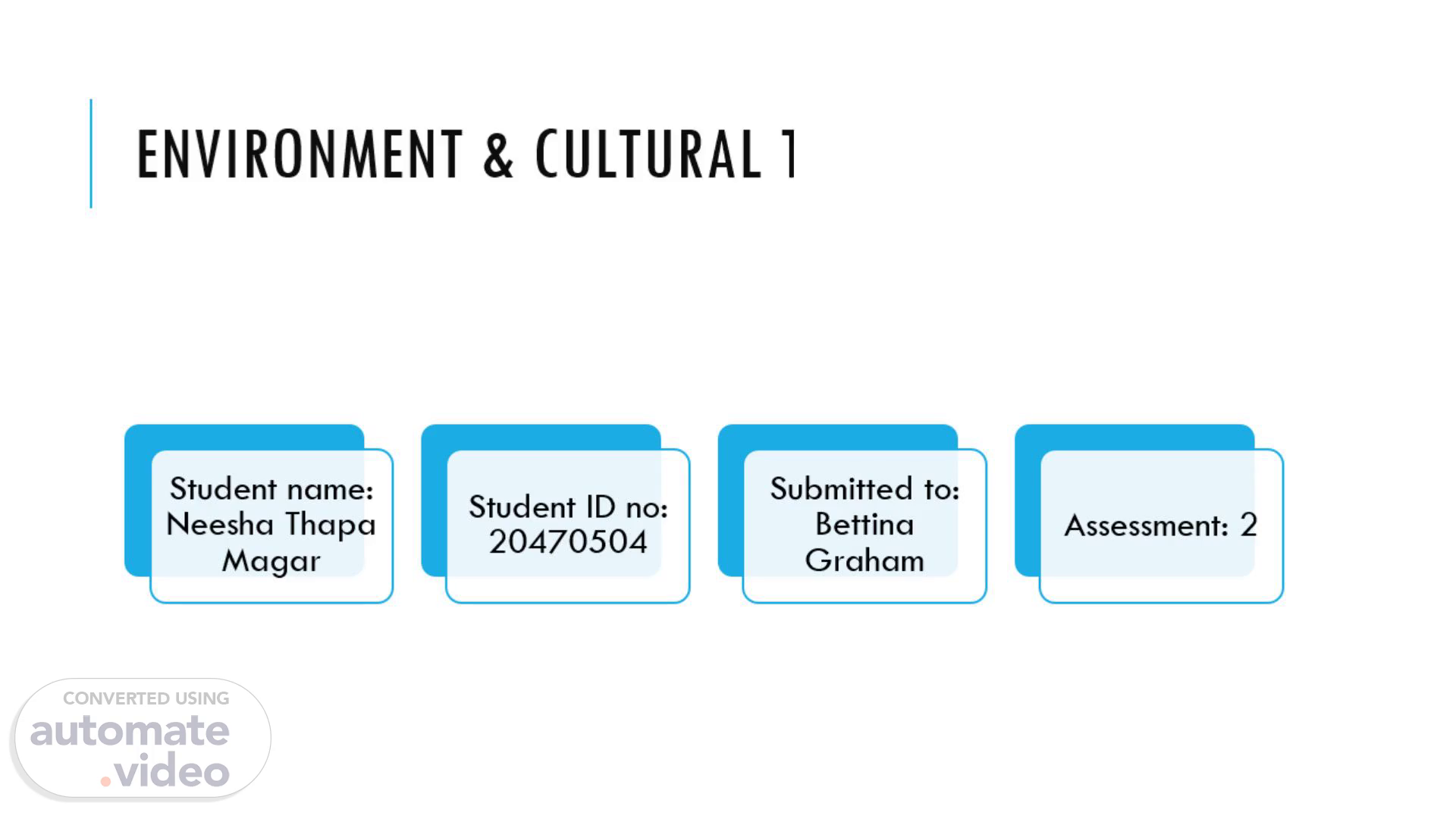
Environment & Cultural Tourism
Scene 1 (0s)
Environment & Cultural Tourism. Student name: Neesha Thapa Magar Student ID no: 20470504 Submitted to: Bettina Graham Assessment: 2.
Scene 2 (10s)
Ngari Capes Marine Park. Ngari Capes Marine Park News ....
Scene 3 (17s)
Introduction. Busselton Jetty. Located between Cape Naturaliste and Cape Leeuwin in Western Australia. This marine park is renowned for its rich biodiversity, pristine waters, and protected coral reefs, making it a popular destination for eco-tourists, divers, and marine enthusiasts The marine park is a watery wonderland for water activities..
Scene 4 (34s)
Wiweka et al.'s Tourism System Model (2019) Examples of External Subsystem Matches.
Scene 5 (59s)
[image] Dolphin underwater on reef background. Examples of Internal Subsystem Matches:.
Scene 6 (1m 24s)
Multiplier Effect and Leakage in Tourism. The Multiplier Effect describes how the spending of tourists at Ngari Capes Marine Park spreads through the local economy. For instance, tourists contribute to local employment through spending on tours, dining, and lodging. This revenue then circulates among local suppliers and workers, benefiting the broader community. Leakage occurs when tourism revenue flows out of the local economy, often due to foreign ownership of tourism operations or the importation of goods. For example, if a large international chain manages an eco-lodge within the park, profits may leave the region rather than benefiting the local community. Both the multiplier effect and leakage are critical in shaping the local economy of the Ngari Capes region. Maximizing the multiplier effect while minimizing leakage is essential for sustainable tourism growth..
Scene 7 (2m 0s)
Iso-Ahola’s Modes of Tourists’ Environmental Interaction (1980).
Scene 8 (2m 25s)
Attractions Reflecting These Interactions. Experiential Mode: Whale watching tours during migration season offer visitors a passive, yet immersive experience with marine wildlife. Experimental Mode: Scuba diving and snorkeling allow visitors to explore coral reefs, interact with marine species, and observe the vibrant underwater ecosystems. Existential Mode: Eco-friendly retreats and marine conservation volunteering programs offer opportunities for visitors to deeply engage with the natural environment over a longer period. Cognitive Mode: Interpretive centers and guided educational tours about the marine ecosystem and conservation efforts provide knowledge-based interactions..
Scene 9 (2m 51s)
[image] Aerial view of a woman on a paddleboard. Visitor Analysis: Future of Global Demand (2022) and Key Experience Clusters.
Scene 10 (3m 19s)
Cultural Tourist Typologies in Ngari Capes Marine Park.
Scene 11 (3m 44s)
Impacts of Climate Change on Ngari Capes Marine Park.
Scene 12 (4m 10s)
Environmental Land Management and Tourism Management Techniques.
Scene 13 (4m 29s)
Design of a New Sustainable Cultural Tourism Product Using Kotler’s Model.
Scene 14 (4m 56s)
Conclusion. Ngari Capes Marine Park presents a dynamic interplay between tourism and the natural environment, making it a significant destination for eco-tourists, marine enthusiasts, and sustainability-minded travellers. Through an analysis of Wiweka et al.'s Tourism System Model, we identified how external factors such as climate change and government policies, along with internal elements like marine biodiversity and infrastructure, shape the park's tourism dynamics. By embracing sustainable tourism practices, Ngari Capes Marine Park can maintain its natural beauty and biodiversity, while offering visitors enriching, transformative experiences that not only benefit the local economy but also preserve this unique marine ecosystem for future generations..
Scene 15 (5m 26s)
Reference. Fingerprint. Hastings, K., & Ryan, K. L. (2017). Differences in perception of a newly created Marine Park in south-west Western Australia by boat-based recreational fishers and the broader community. Marine Policy, 77, 65-77. Bessey, C., Rule, M. J., Dasey, M., Brearley, A., Huisman, J. M., Wilson, S. K., & Kendrick, A. J. (2018). Geology is a significant indicator of algal cover and invertebrate species composition on intertidal reefs of Ngari Capes Marine Park, south-western Australia. Marine and Freshwater Research, 70(2), 270-279. LI, E. A. (2013). Ngari Capes Marine Park. Wiweka¹, K., & Arcana, K. T. P. (2019). Rethinking the Theory of Tourism: What is Tourism System in Theoretical and Empirical Perspective?. Wiweka, K., Setiawan, B., Wachyuni, S. S., & Adnyana, P. P. (2020). Local perspective of community participation in lake toba as a tourism destination. Int. J. Tour. Hosp. Rev, 7(1), 87-94..